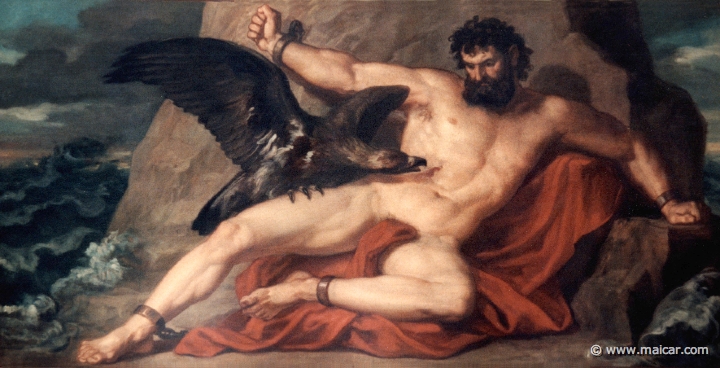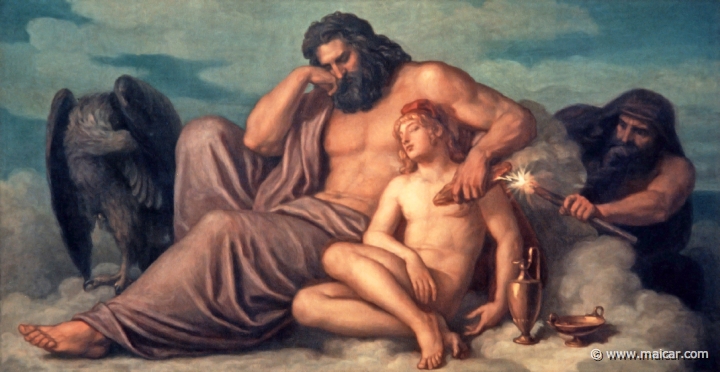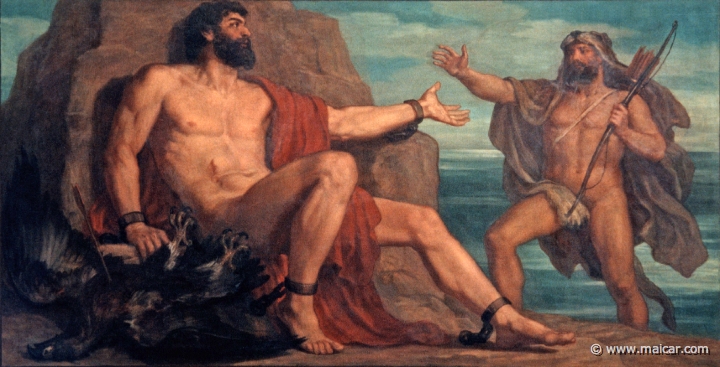|

|
Prometheus 1 tortured by the eagle. 3804: Christian Griepenkerl (1839-1916): Die Strafe. Griepenkerl-Gemälde im Treppenhaus des Augusteums.
|
|
|
"It is easy for him who keeps his foot free from harm to counsel and admonish him who is in misery" (Prometheus 1. Aeschylus, Prometheus Bound 265).
"Thus I helped the tyrant of the gods and with this foul payment he has responded; for it is a disease that is somehow inherent in tyranny to have no faith in friends." (Prometheus 1. Aeschylus, Prometheus Bound 225).
"Prometheus, you are glad that you have outwitted me and stolen fire ... but I will give men as the price for fire an evil thing in which they may all be glad of heart while they embrace their own destruction." (Zeus to Prometheus 1. Hesiod, Works and Days 55).
|
|
Prometheus 1 is remembered mainly for having stolen fire from the gods, and for the terrible punishment he suffered for doing it.
Creator of men
The Titan Prometheus 1 is usually regarded as one of the greatest friends of mankind, and the saviour of all men. For when Zeus attempted to destroy
the men of the Bronze Age through The Flood, he gave
instructions to his son Deucalion 1, so that he could survive and mankind could start anew. Some have even asserted that man was moulded out of water and earth by Prometheus 1 himself, who gave him the form of the gods and
" ... bade him
to stand erect and turn his eyes to heaven." (Ovid, Metamorphoses 1.85).
But others say that he and his brother just distributed abilities among creatures: It has been told that when the time arrived for mortal creatures to be created, the gods, after moulding their forms, charged Prometheus 1 and his brother Epimetheus to deal faculties to each creature. Epimetheus, they say, persuaded Prometheus 1 to let him do the dealing himself, saying that afterwards Prometheus 1 could examine what he had done. And to some creatures Epimetheus gave strength, and to others speed; some he armed and others he left unarmed, though giving them some other faculty so that they could survive. To some he gave wings, so that they could escape, and to others he gave the capacity to live underground. And while he distributed all capacities he took the precaution that no species should be extinguished. Likewise Epimetheus took into consideration the seasons, giving to all creatures the faculty of resisting both cold and heat. In similar manner he furnished each kind of creature with its proper food, so that some should feed on grass, others on fruits, and still others on creatures which they could devour. This is how Epimetheus, lacking in wisdom and forethought, distributed all properties suited for survival among animals, leaving unequipped the race of men. Now, when the day arrived for the emergence of all creatures and Prometheus 1 came to examine his brother's work, he noticed that Epimetheus had not devised anything for the preservation of humans. So in order to correct his brother's mistake, Prometheus 1 stole wisdom in arts from Hephaestus and Athena, along with fire, so that men could exercise those crafts, and gave all these gifts to humanity. Accordingly, Prometheus 1, for correcting mistakes in such a way, was later charged with theft.( (For another angle om Epimetheus, see Epimetheus - Brief One-Act Play in Three Scenes.)
More cleverness
It has also been said that Prometheus 1 taught men to sacrifice to the gods in a clever way, casting only a part of the victim into the fire, and keeping the rest for their own food. It is told that Prometheus 1 deceived Zeus with a trickery concerning the part which should be sacrificed to the god and the part which would remain for men. For Prometheus 1 concealed the different parts in a certain way, and having given Zeus the chance to choose
among them, the god, without any forethought, chose
just the bones for his half. They believe that it
was because of this trickery that Zeus decided to hide the
fire, and prevent men to use it.
Pandora 1
Probably fearing the consequences of his own cleverness, Prometheus 1 told his brother Epimetheus never to take a gift from Zeus, but Epimetheus, a man
with no foresight, accepted Zeus' gift
(Pandora 1), and he
only later understood what had happened. For until
that time men lived free from ills, toil and
sicknesses, but Pandora 1 opened a jar containing all kinds of evils, and these flew out, afflicting mankind ever since. Only Hope remained there. Prometheus 1 fashioned man from clay, and the gods fashioned the first woman, Pandora 1. This is the reason why Pyrrha 1, the daughter of Epimetheus and Pandora 1, is called the first mortal woman ever born. Others affirm that Pandora 1 was not a
curse sent from heaven, but that Pandora 1, who was endowed with all kinds of gifts, was given by the gods to men because the gods wished to show all mortals that they could do even better than Prometheus 1, who had given them fire.
|

|
Prometheus 1 stealing the fire from Zeus while the god rests with Ganymedes. 3802: Christian Griepenkerl (1839-1916): Raub des Feuers. Griepenkerl-Gemälde im Treppenhaus des Augusteums, Oldenburg.
|
|
Friend of mankind
Now, when Cronos was
king in heaven, the OLYMPIANS fought a war
against him, and having dethroned him, gave the
rule to Zeus, who punished
both Cronos and the TITANS that supported his
cruel order. Prometheus, himself a Titan,
forewarned by the Titaness Themis, who knew that
neither the brute nor the violent would prevail,
rallied with her to the side of Zeus, who finally prevailed. The new ruler proceeded then to apportion to the gods their prerogatives, but the race of man, which some assert was moulded out of water and earth by Prometheus 1 himself, he purposed to destroy. It was then that Prometheus 1, out of compassion for that wretched breed of mortals, planted blind hope in their hearts, and having stolen fire from heaven—which he hid in a stalk of fennel—gave it to men, teaching them many arts and handicrafts. For this audacious deed, Prometheus 1 paid a high price, being severely punished by the Zeus, the new king of heaven. But among men he came to be called "benefactor," a curious title considering that humans rapidly made a habit of employing Prometheus 1's gifts to cook and burn one another in many ways.
Prometheus 1' tortured
When Zeus learned about
the theft, he ordered Hephaestus to nail Prometheus 1's body to Mount Caucasus, which he did with the help of Cratos (Power) and Bia (Force), but some affirm that it was Hermes who nailed Prometheus 1. On a rock in that mountain, Prometheus 1 was kept bound for many years. And every day an eagle swooped on him and devoured the lobes of his liver, which grew by night as much as the eagle had devoured during the day. Some say that this eagle (which some say ate his heart, not his liver) was the offspring of Typhon and Echidna, but others affirm that Hephaestus fashioned
it. Medea is said to have used in her sorcery a Caucasian herb of great potency, sprung from the gore that dropped from the liver of Prometheus 1. She is also said to have used a charm, called "the charm of Prometheus" that anointed on the body (along with other rites) bestowed invulnerability. Being a Titan, Prometheus 1 should be immortal by birth (a sad privilege since ages of torture awaited him). Yet, some affirm that Prometheus 1 was granted immortality, after Heracles 1 shot the
Centaur Chiron with a
poisoned arrow. The wound proved incurable, and Chiron wished to die, but being immortal, he could not. It was then that Prometheus 1 offered himself to Zeus to be immortal in his
stead, and the request being granted by the god, Chiron died and Prometheus 1 obtained immortality.
Credit to Phoroneus
There are those who do not admit that fire was given to mankind by Prometheus 1, and claim that the discoverer of fire was Phoroneus, a son of the river god Inachus and king in Peloponnesus, called "the first man." Prometheus 1, they say, did not steal the fire from the gods, but was the discoverer of the procedure from which fire may be kindled.
Freedom in exchange for information
|

|
Heracles 1 sets Prometheus 1 free. 3805: Christian Griepenkerl (1839-1916): Befreiung durch Herakles. Griepenkerl-Gemälde im Treppenhaus des Augusteums.
|
|
Prometheus 1 is also admired for his resistance against what he perceived as the tyranny and ingratitude of Zeus. Though chained to a rock, he was not deprived of means of resistance: For Zeus contemplated, at the time, marriage with Thetis. And there was a prediction about this nereid, which the god ignored: That her son would be greater than his father. And if that secret were not revealed to Zeus, he would be hurled
from his throne as Cronos had been before him. Being in possession of this secret Prometheus 1 warned the god, declaring that he would provide him with vital information if he would free him from his chains. When the god accepted the bargain, Prometheus 1 advised Zeus not to wed Thetis, for
if one greater than he were born he might become
the ruler of heaven in Zeus' place. This is why Thetis was given in marriage to Peleus, being delivered
of a child Achilles,
who became greater than his father. Others say,
however, that Thetis would not consort with Zeus in any case because
she had been brought up by Hera, and that Zeus, wishing to punish her, married her to a mortal, his own grandson Peleus. When the agreement was reached, Heracles 1 was sent to kill the eagle that ate Prometheus 1's heart or liver, and release the prisoner after thirty thousand years of torture.
Rings and Wreaths
It is said that Zeus did not release Prometheus 1 from all binding, since he had sworn to that, but for commemoration bade him bind his finger with stone and iron; and that is why, men adopted the custom of wearing rings fashioned of stone and iron, that they may seem to appease Prometheus 1. Similarly, it has been said that Prometheus 1 wore a wreath, as if to claim that he as victor had revolted and yet did not suffer punishment for ever. And so the practice began of wearing wreaths at time of victory or rejoicing.
Birth of Athena
Some assert that it was Prometheus 1 who smote the head of Zeus with an
axe, and Athena, fully
armed, leaped up from the top of his head. Others
say that it was Hephaestus who did
this.
Another with the same name
Prometheus 2 is the name of a Boeotian to whom Demeter entrusted something. What was entrusted is a sacrilege to put into writing. Prometheus 2 had a son Aetnaeus.
|